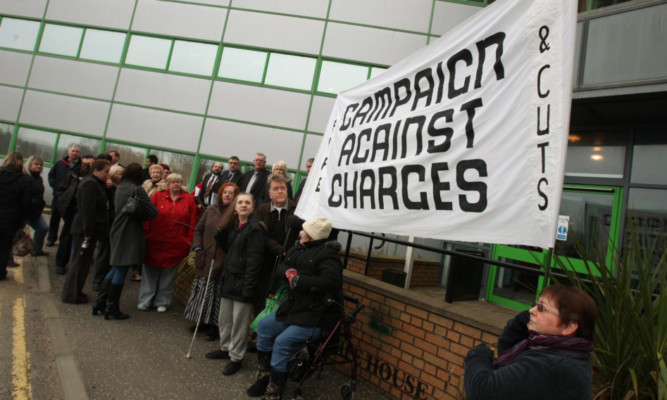FIFERS HAVE been urged to call for the scrapping of controversial home care charges during the council’s budget consultation.
The move is one of the options put foward by the local authority, which aims to save almost £66 million over the next three years.
Removing the unpopular charge, imposed by the previous SNP/Lib Dem administration, would cost Fife Council £300,000.
However, campaigners who have fought the levy since it was first mooted five years ago say the amount is a drop in the ocean compared to the entire budget particularly as it costs taxpayers £50,000 a year to collect.
Local people currently have the chance to comment on the Labour administration’s draft budget proposals by picking up consultation packs from libraries and council offices, or logging on to fifedirect.org.uk/budget. The deadline is January 6.
Within the pack, under the section headed investments, the administration says: “It is proposed to remove the homecare charge from all Fife residents at a cost of £300,000. This charge has been widely criticised as being specifically unfair to disabled people.”
Maureen Closs from the Campaign Against Charges and Cuts (CACC) group, said she hoped as many people as possible would support the chance to scrap the charges.
“It is five years this month since we held our first demonstration up at Fife House against home care charges, which were to rise from zero up to £11 per hour,” she said.
“Despite a universal hatred of the policy, the then administration dug its heels in and refused to be persuaded of the injustice of what they were doing.
“They thought that disabled people were a soft touch.”
Ms Closs said the revenue from the charges amounted to just £245,000, a far cry from the £667,000 predicted five years ago.
“Frankly, it is a drop in the ocean of the council’s £800 million budget,” she added.
“Conversely, the individual effects on those who do pay are quite staggering.”
The charges were introduced during a budget-setting exercise under the previous administration, who argued that only those who could afford to pay would.
They were imposed on a sliding scale up to a maximum of £11 per hour, and while the council said most people would continue to pay nothing, they proved extremely unpopular and sparked one of the most bitter and determined campaigns in Fife’s recent history.
“Disabled people don’t ask for their impairments they’d much rather be able to lead an independent life like most of the population,” said Ms Closs.
“The services they receive are vital without home care many people would be confined to bed.
“It used to be that district nurses carried out personal care tasks with no thought of charging.
“We don’t pay for hospital care because we are a nation that makes free health care a priority, regardless of patient’s means.
“Similarly, we don’t pay for bin collections, children’s education, library services.”
She added: “We do see the council subsidising buses, leisure services, golf courses, and all of this should be available in a civilised society.
“Personal care is perhaps one of the most vital services and should be a right, just like education.”
Ms Closs said the other costs attached to disability were not taken into account.
“Often people need extra heating, special diets and special equipment, which have to be maintained and eventually replaced,” she said.
“If they want to go out, they often have to pay someone to help them get in and out of cars, cut up food if they’re out for a meal, and also pay the cost of the meal for their companion helper.
“A bed that has the facility to turn people on to their side costs upwards of £10,000, and specialised wheelchairs £6,000.”
cwarrender@thecourier.co.uk
